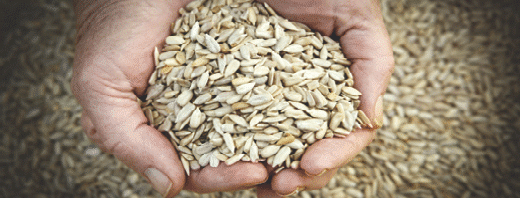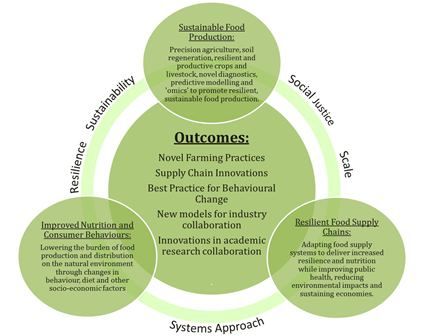
The University of Leeds will be driving innovation in food security after a new multi-million pound research grant was awarded by government.
Initial funding of £16m will be allocated to the N8 Research Partnership, which brings together universities across the North of England to collaborate on priority research.
The government has awarded £8m towards the project, to be matched equally by each of the N8 universities (Durham, Lancaster, Leeds, Liverpool, Manchester, Newcastle, Sheffield and York).
With a growing global population, providing access to enough affordable, safe and nutritious food is seen as one of the greatest challenges to society, and there is an overriding need to ensure food production is both sustainable and resilient.
The research programme will examine three key areas of concern in food security - sustainable food production, resilient food supply chains, and the need for improved nutrition and greater understanding of consumer behaviour.
The aim for the N8 is to transform food security research in the UK and create a world-leading collaboration on Agri-Food Resilience within 10 years.
Professor Tim Benton from the University of Leeds, who is the UK’s Global Food Security Programme Champion, explained: “Put simply, agri-food is the business of producing food, and we need to improve how we generate enough safe and nutritious food, so that it is capable of being maintained socially, environmentally and economically.
“The challenge is to feed nine billion people by 2050 yet all around us is uncertainty, whether that’s the drivers of consumer choice and preference, unstable climates, new pests and diseases, the need for healthier, functional nutrition, or increased competition for land, water and energy.
“UK research and technology can help innovate this industry. But this means bringing together world-leading crop and livestock research, with insights into how best to increase the resilience of food supply chains, along with our understanding of people’s behaviours and nutritional and dietary needs.”
The aim of the N8 Agri-Food Resilience Programme is to work with companies and farmers to apply the research insights, including increasing their capacity to horizon scan, developing new tools and techniques for sustainable food production, as well as influencing policy makers and public opinion to develop more stable and equitable supply chains.
It also includes promoting better nutrition and sustainable consumption, as well as developing interventions that improve diet, wellbeing and health.
The programme combines the different university facilities and brings together expertise in the already-established specialist agri-food research centres, including five experimental farms and laboratory scale facilities.
As well as behavioural change expertise to encourage healthier, sustainable food choices, increasing our understanding of the effects of food and food components on health and wellbeing, the research will draw on Leeds’ growing capabilities in data analytics.
This involves, for example, using bioinformatics of plants and animal genomic data, or exploiting combinations of existing data sets such as climate information and plant disease records, to develop predictive modelling for disease control and treatment in crops and livestock. Understanding consumers’ purchasing behaviour is a further angle to the big data capability at Leeds.
It will also build on expertise in energy, with plans to minimise energy footprints throughout food and agriculture supply chains, as well as utilising strengths in robotics and autonomous systems, potentially revolutionising farming through, for example, automated detection and control of weeds and insects.
Leeds’ strengths in synthetic biology will also come into play, through breeding new livestock and developing new crop varieties that are resilient to the changing environment and resistant to new pests and diseases.
Professor Louise Dye, Chair of Nutrition and Behaviour at the University of Leeds, said: “We really can’t underestimate the pressures on the UK’s food security and a huge part of the problem is our demand for food.
“If we are going to make any inroads into changing consumption patterns, we need to understand how and why people make the decisions they do about the food they consume. This means understanding the impact of food consumption and waste, raising awareness of the effects of food on nutrition and health, and helping people change their habitual dietary patterns to promote better health and wellbeing.”
Figure: Programme initiatives
Sir Alan Langlands, Chair of the N8 Board of Directors and Vice Chancellor of The University of Leeds, added: “Food security is one of the great challenges in our increasingly urbanised and globalised world. The is a task beyond any single research group or institution and this funding means that the N8 can now implement an integrated, large scale research programme which will make a major, long-term impact in addressing the challenge of food security.
“The N8 Research Partnership has great strength, expertise and resources to make progress in this area.”
The N8 Research Partnership already has an impressive track record in agri-food science, with more than 370 researchers working on projects in this area and a portfolio of £269 million of research funding over the last six years.
The University of York will host the N8 Agri-Food Resilience Programme on behalf of the N8 Research Partnership. The duration of the project is initially five years.
The funding was announced by Greg Clark MP, Minister for Universities, Science and Cities, on 25 March 2015.
Funding details
The Higher Education Funding Council for England (HEFCE) has awarded the N8 Research Partnership a grant of £7,999,254 through its Catalyst Fund to develop the Agri-Food Resilience Programme. This will be matched equally by the N8 universities.
The Government has highlighted Agri-Tech as one of the nine priority sectors in its industrial strategy. The vision of the Government's UK strategy for agricultural technologies is to make the UK a world leader in agricultural technology, innovation and sustainability. The £70m Agri-Tech Catalyst, run by Innovate UK and the Biotechnology and Biological Sciences Research Council (BBSRC), offers funding to innovative businesses and researchers to develop solutions to innovative solutions to challenges in the agri-tech sector.
See here for the UK Industrial Strategy for Agricultural Technologies.
The UK's main public funders of food-related research and training are working together through the Global Food Security programme to meet the challenge of providing the world's growing population with a sustainable, secure supply of good quality food from less land and with lower inputs. Watch the video here.
Read Professor Tim Benton’s blog on what science research can, and can’t, do to help provide nutritious food for all here.
Example N8 Research Partnership project
A multidisciplinary team has worked on Leeds University Farm to integrate fundamental research on soil-crop interactions, and agronomic and hydrological expertise, to identify the microbial and geochemical factors that most influence the acquisition of nutrients by crops.
Closer working with the innovative agricultural sensor programme at Manchester, complex systems experts (York) and data analysts (Leeds & York) would yield the data and understanding that would allow practical applications to be developed for real farm systems.
Food expertise at the University of Leeds and related links
• Leeds Food – established to bring researchers from across the University of Leeds together to tackle global food security challenges. Key areas of work include: agriculture and food production systems; food informatics; product adulteration detection systems; food processing, food, nutrition and wellbeing; nutrition trials network and food politics and justice. http://foodhub.leeds.ac.uk/
• Water@Leeds – one of the largest interdisciplinary water research centre of its kind in the world. Key areas of work include: examining the impact of growing global populations; increased water consumption; and shifting climate, rainfall and land use patterns. http://www.wateratleeds.org/
• Human Appetite Research Unit – a world leading research group looking at the effects of food on nutrition and health. Key areas of work include: understanding the effects of food on health, wellbeing and behaviour; food choice, appetite control and cognitive function; dietary intervention studies.
• Centre for Decision Research – based in the Leeds University Business School, its key areas of work focuses on the way individuals, groups and organisations make decisions
Read more about the ESRC Funded Seminar Series on Food Options, Opinions and Decisions here. The seminars aim to understand and improve UK consumers’ decisions about nutrition, food safety, and domestic food waste.
• Nutritional Epidemiology Group – a research group examining impact of nutrition on population health. Key areas of work include: studying the diets of different populations; assessing the impact of nutrition interventions on diet, knowledge and attitude to food; identifying the best ways of measuring the diet of populations (e.g. children); examining the relationship between diet and chronic disease
• Leeds Institute of Data Analytics - home of two major programmes for data intensive research – the MRC Centre for Medical Bioinformatics and the ESRC Consumer Data Research Centre.
For further information
Contact the University of Leeds press office on 01133434031 or email pressoffice@leeds.ac.uk
